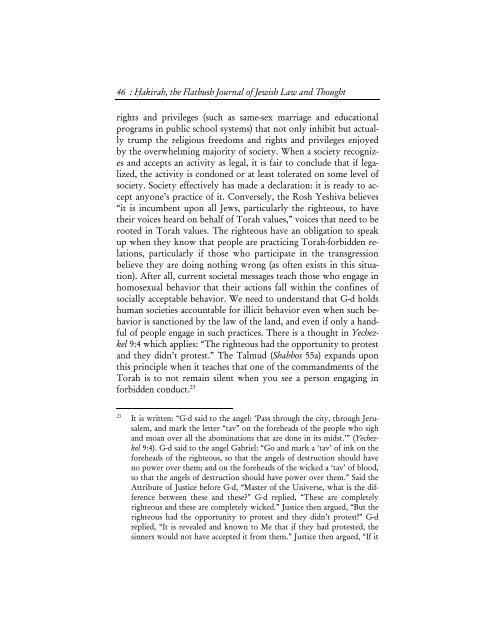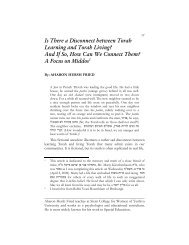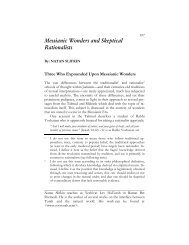A Discussion with Rabbi Shmuel Kamenetsky on âSSAâ - Hakirah.org
A Discussion with Rabbi Shmuel Kamenetsky on âSSAâ - Hakirah.org
A Discussion with Rabbi Shmuel Kamenetsky on âSSAâ - Hakirah.org
Create successful ePaper yourself
Turn your PDF publications into a flip-book with our unique Google optimized e-Paper software.
46 : Hạkirah, the Flatbush Journal of Jewish Law and Thoughtrights and privileges (such as same-sex marriage and educati<strong>on</strong>alprograms in public school systems) that not <strong>on</strong>ly inhibit but actuallytrump the religious freedoms and rights and privileges enjoyedby the overwhelming majority of society. When a society recognizesand accepts an activity as legal, it is fair to c<strong>on</strong>clude that if legalized,the activity is c<strong>on</strong>d<strong>on</strong>ed or at least tolerated <strong>on</strong> some level ofsociety. Society effectively has made a declarati<strong>on</strong>: it is ready to acceptany<strong>on</strong>e’s practice of it. C<strong>on</strong>versely, the Rosh Yeshiva believes“it is incumbent up<strong>on</strong> all Jews, particularly the righteous, to havetheir voices heard <strong>on</strong> behalf of Torah values,” voices that need to berooted in Torah values. The righteous have an obligati<strong>on</strong> to speakup when they know that people are practicing Torah-forbidden relati<strong>on</strong>s,particularly if those who participate in the transgressi<strong>on</strong>believe they are doing nothing wr<strong>on</strong>g (as often exists in this situati<strong>on</strong>).After all, current societal messages teach those who engage inhomosexual behavior that their acti<strong>on</strong>s fall <str<strong>on</strong>g>with</str<strong>on</strong>g>in the c<strong>on</strong>fines ofsocially acceptable behavior. We need to understand that G-d holdshuman societies accountable for illicit behavior even when such behavioris sancti<strong>on</strong>ed by the law of the land, and even if <strong>on</strong>ly a handfulof people engage in such practices. There is a thought in Yechezkel9:4 which applies: “The righteous had the opportunity to protestand they didn’t protest.” The Talmud (Shabbos 55a) expands up<strong>on</strong>this principle when it teaches that <strong>on</strong>e of the commandments of theTorah is to not remain silent when you see a pers<strong>on</strong> engaging inforbidden c<strong>on</strong>duct. 2323It is written: “G-d said to the angel: ‘Pass through the city, through Jerusalem,and mark the letter “tav” <strong>on</strong> the foreheads of the people who sighand moan over all the abominati<strong>on</strong>s that are d<strong>on</strong>e in its midst.’” (Yechezkel9:4). G-d said to the angel Gabriel: “Go and mark a ‘tav’ of ink <strong>on</strong> theforeheads of the righteous, so that the angels of destructi<strong>on</strong> should haveno power over them; and <strong>on</strong> the foreheads of the wicked a ‘tav’ of blood,so that the angels of destructi<strong>on</strong> should have power over them.” Said theAttribute of Justice before G-d, “Master of the Universe, what is the differencebetween these and these?” G-d replied, “These are completelyrighteous and these are completely wicked.” Justice then argued, “But therighteous had the opportunity to protest and they didn’t protest!” G-dreplied, “It is revealed and known to Me that if they had protested, thesinners would not have accepted it from them.” Justice then argued, “If it
















